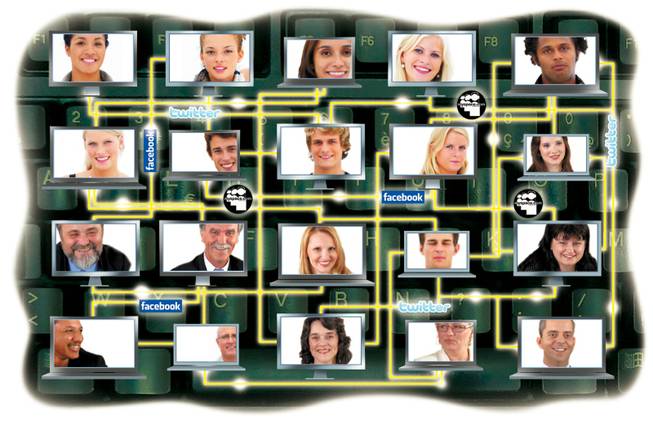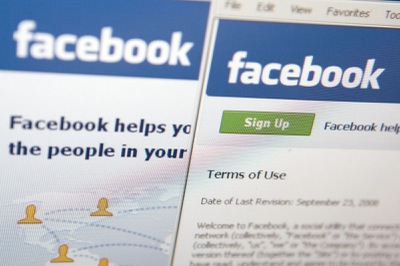Friday, June 19, 2009 | 3 a.m.
Sun Coverage
Social networking sites once relegated to the realm of teenagers in basements have become a major tool for professionals and businesses.
A study recently completed by AMI Partners for software company Sage North America found that small businesses are embracing the Internet and social networking sites in particular, as a way to increase their business.
The survey found that small businesses were using sites such as MySpace, Facebook and LinkedIn to connect with customers. Entrepreneurs were more likely to use social media as online extensions of traditional word-of-mouth marketing.
Sites such as these have become a popular place for companies of all types, from pizza parlors to casinos to law firms, to make a more personal connection with clients and to better control the image their companies have on the Web. It’s also a way to keep clients updated on the latest trends.
“A lot of businesses are doing it now; there are benefits to it,” said Manita Rawat, an attorney with Holland and Hart, which has its own Facebook page. “People use the Internet as a means for getting the news or researching firms or businesses. I mean, how many people look at the phone book now? ... It’s a really good tool.”
But not everyone is comfortable with the social networking sites yet.
The AMI survey found that more than half of the respondents said online security is a top concern preventing them from embracing new social media.
But those who use the sites for business purposes said social networking sites actually make it easier to control what the public sees about their companies on the Internet.
Sites such as Facebook and MySpace allow any member, including businesses, to communicate with the public in a neutral setting while they maintain control over the conversations or information about the company that is posted on the site. They can even permanently block people who might be a danger to the business or its reputation.
“You don’t want people saying negative things on Facebook,” Rawat said. “But these sites allow you to control who can write on the wall. So you can control the image.”
And long gone are the days when social networking sites were only a good marketing tool for those trying to reach the teeny-bopper or college crowd.
Today, people of all ages and types use these sites to keep in touch, to network or even to recruit employees.
“You now have online social networking tools that are graphing a large segment of the population,” Rawat said. “The Baby Boom generation is using it to stay in touch with families. It’s no longer just a tool for 16-year-olds to gossip with classmates. It’s now a tool being used by a large swath of the population.”
That same trend makes it a good tool for network with colleagues. Rawat said she has received and given referrals to other attorneys using her account on LinkedIn. She uses the account to network with other legal professionals she meets on the job or at networking events.
“In terms of referrals, social networking is a great way to network,” she said.
It’s also increasingly used to evaluate job candidates.
Christian Zinn, a labor and employment lawyer with Lewis and Roca, said he occasionally gets calls from human resources departments asking parameters of searching social networking sites for candidates.
He said generally these companies want to check MySpace and Facebook to get a better idea of what the candidate is really like.
This is a sticky area, legally. But if a candidate’s MySpace account is fully accessible to the public, there’s nothing illegal about the employer taking a peek.
The problems arise when employers find information on the site that could illegally prejudice them against an applicant.
“There are potential risks in using them in hiring,” Zinn said. “On MySpace, you can list your age and race, or religion for example. There are blog posts on them about social activities like baby showers. So an employer would learn a candidate’s age, her race or that she’s pregnant. All of those are illegal questions during interviews.”
That doesn’t mean businesses shouldn’t use these sites, especially if they have strict ethics policies. But they should definitely limit who does the searches to someone trained in discrimination in hiring such as a human resources director, Zinn said.
They should also inform applicants that they are going to do it.
“There have been a few lawsuits in this area,” Zinn said. “It’s an emerging issue, but it’s going to be out there, especially in this economy. It’s hard to find a job, and there are people out there who will file charges of discrimination seeking damages just because of the economic times.”
It’s also key not to violate an applicant’s privacy. A business should only peek in on people’s social networking sites if it’s necessary.
“Simply because the information is available out there doesn’t mean you need to look at it,” Zinn said. “Is it for curiosity or does it serve a purpose? If it’s the former, you should have a policy that you don’t use social networking sites.”
It can also cause liability issues if someone at the company goes to extreme measures to view a candidate’s social networking site if it has been blocked from public view.
Many professionals use sites such as Facebook for communicating with friends and are careful to set their privacy settings high so that strangers can’t view their private conversations.
“Don’t try to ‘friend’ someone just to look at their information or ask someone on their ‘friend’ list to show you their page if they have privacy settings,” Zinn said. “If it’s not readily available to the public, then you have serious privacy rights issues.
“An employer should not be attempting to infiltrate people’s social networking pages in any way if that employee or applicant has privacy settings in place.”
That doesn’t mean companies shouldn’t check what disgruntled or former employees are saying about the company on their public social networking pages.
Most companies have policies banning employees from posting derogatory things about the workplace or company on the Internet. And Zinn said there’s nothing wrong with dismissing someone for attacking his employer as long as it’s well documented.
Increasingly, posts to social networking sites are being used to defend companies in court.
Lawyers have used posts on Facebook to demonstrate that an employee inflated or invented claims of a hostile work environment or discrimination.
“It’s a research tool for lawsuit defense,” Zinn said. “If you have employees who say they were subject to a hostile workplace because of foul language and then you go to their MySpace page and they have blogs ranting and using explicit language or it has pictures of them giving the finger to the camera, that brings into question the charge that they are saints and the employer is a sinner.
“It raises the question of whether your employer was truly offending you.”




Join the Discussion:
Check this out for a full explanation of our conversion to the LiveFyre commenting system and instructions on how to sign up for an account.
Full comments policy